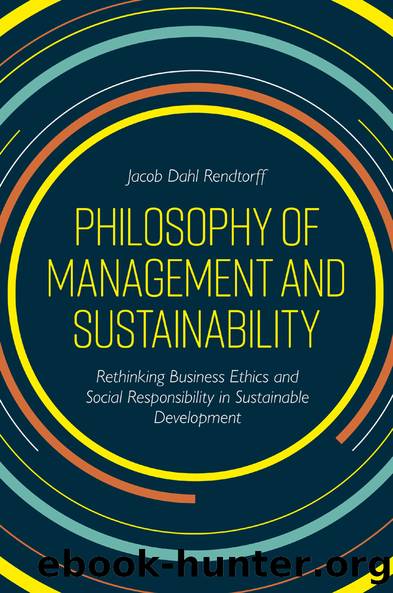Philosophy of Management and Sustainability by Jacob Dahl Rendtorff;

Author:Jacob Dahl Rendtorff; [Неизв.]
Language: eng
Format: epub
ISBN: 9781789734553
Publisher: Emerald Publishing
Published: 2019-08-27T21:00:00+00:00
3. Application of an Ethical Economy: Ecology, Sustainability, and Capitalism
An important application of the ethical economy is the problem of sustainability in economics and business. Since the industrial revolution businesses have had to deal with environmental problems, but it was not until the late 1960s that these problems came to be commonly understood as severe and requiring thoughtful and efficient solutions on a global scale. There are not only problems of global warming, ozone depletion, acid rain, and depletion of air quality but also problems of water pollution (e.g., toxic oil spills), temperature increases, the destructive use of ocean fishery resources, and further problems of land pollution (e.g., destruction of forests, chemical or toxic substance deposits, radioactive, and nuclear wastes) and deteriorating ecological conditions including the destruction of animal habitats (Velasquez, 2002, pp. 269ff). In the words of the ecological ethicist Aldo Leopold: âSociety has been in search of a land ethic of âintegrity, stability and beautyâ in order to protect the intrinsic value and self-organization of the natural worldâ (Velasquez, 2002, p. 290).
Until quite recently, economic markets functioned according to the idea that unlimited resources were at humankindâs disposal. It was only during the second half of the twentieth century that an increasing awareness of the impossibility of naturally regulated markets began to emerge. Still, it has been extremely difficult, if not impossible, to find the correct balance between economic growth and the environment. In the late twentieth and early twenty-first centuries, the view that corporations should focus on gaining economic profit without concern for the environment has been strenuously challenged. Today there is even more awareness of the fact that environmental concerns in business might contribute to good business and that good environmental policies pay (Hoffman, 1991). The problem of global climate change may, because of its serious impact on global life, be one of the drivers for increased awareness of the need for action relating to environmental degradation (Levy & Newell, 2005, p. 85). Corporations and institutions facing this problem start to be aware that they need to take environmental problems seriously in order to obtain social respect and appear as good corporate citizens (Rendtorff, 2015b).
Joseph R. Desjardins ([1999] 2002a, pp. 280 & 286) emphasizes that the idea of sustainable development implies a new kind of environmental business responsibility. Environmental issues represent a challenge to the concept of growth that is central to neoclassical mainstream economics. When dealing with corporate social responsibility (CSR) to the environment, business ethics has to rely on the development of a theory of sustainable economics. In this way, the concept of sustainability implies a redefinition of economics that moves away from the concept of endless growth regardless of limited natural resources. Hermann Daly has tried to reformulate economic theory by focusing on environmental concerns not only as a side constraint but as essential to all kinds of economic action. Daly argues that there are ecological limits to economic growth, and that the economic system of the world is dependent on the natural world which functions as the basis for economic resources and energy (Daly, 1996).
Download
This site does not store any files on its server. We only index and link to content provided by other sites. Please contact the content providers to delete copyright contents if any and email us, we'll remove relevant links or contents immediately.
| Anthropology | Archaeology |
| Philosophy | Politics & Government |
| Social Sciences | Sociology |
| Women's Studies |
The remains of the day by Kazuo Ishiguro(7541)
Tools of Titans by Timothy Ferriss(6934)
The Black Swan by Nassim Nicholas Taleb(6182)
Inner Engineering: A Yogi's Guide to Joy by Sadhguru(5886)
Giovanni's Room by James Baldwin(5870)
The Way of Zen by Alan W. Watts(5787)
The Six Wives Of Henry VIII (WOMEN IN HISTORY) by Fraser Antonia(4784)
The Power of Now: A Guide to Spiritual Enlightenment by Eckhart Tolle(4747)
Astrophysics for People in a Hurry by Neil DeGrasse Tyson(4613)
Asking the Right Questions: A Guide to Critical Thinking by M. Neil Browne & Stuart M. Keeley(4564)
12 Rules for Life by Jordan B. Peterson(3722)
The Ethical Slut by Janet W. Hardy(3494)
Skin in the Game by Nassim Nicholas Taleb(3455)
Housekeeping by Marilynne Robinson(3395)
The Art of Happiness by The Dalai Lama(3376)
Double Down (Diary of a Wimpy Kid Book 11) by Jeff Kinney(3267)
Skin in the Game: Hidden Asymmetries in Daily Life by Nassim Nicholas Taleb(3259)
Walking by Henry David Thoreau(3227)
12 Rules for Life: An Antidote to Chaos by Jordan B. Peterson(3195)
